【新课标】Module 1 How to learn English Unit 3 Language in use课件(共39张PPT)
文档属性
| 名称 | 【新课标】Module 1 How to learn English Unit 3 Language in use课件(共39张PPT) |  | |
| 格式 | zip | ||
| 文件大小 | 3.8MB | ||
| 资源类型 | 试卷 | ||
| 版本资源 | 外研版 | ||
| 科目 | 英语 | ||
| 更新时间 | 2022-09-05 23:53:31 | ||
图片预览

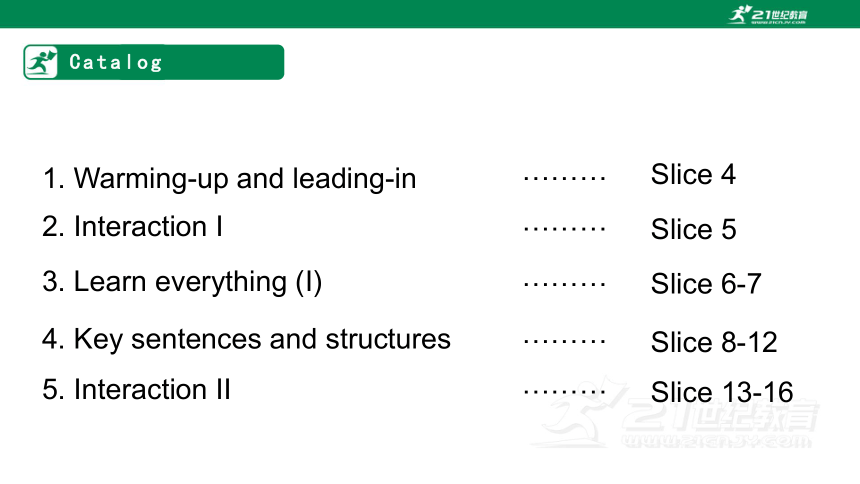
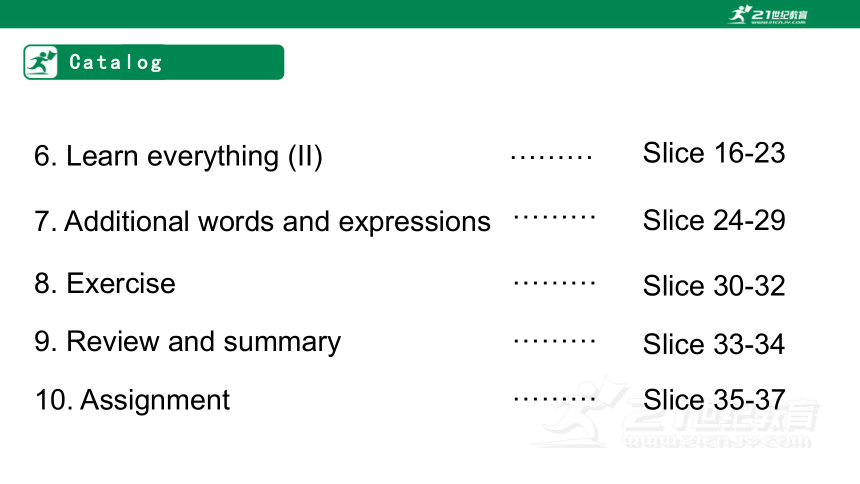
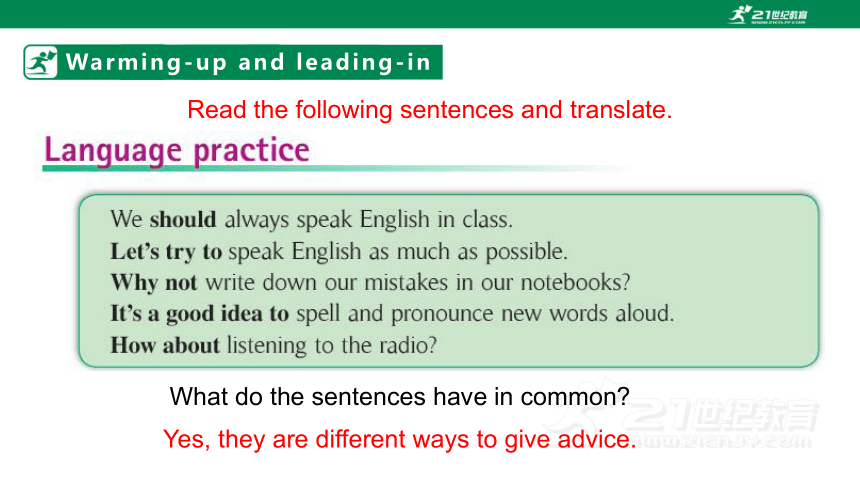
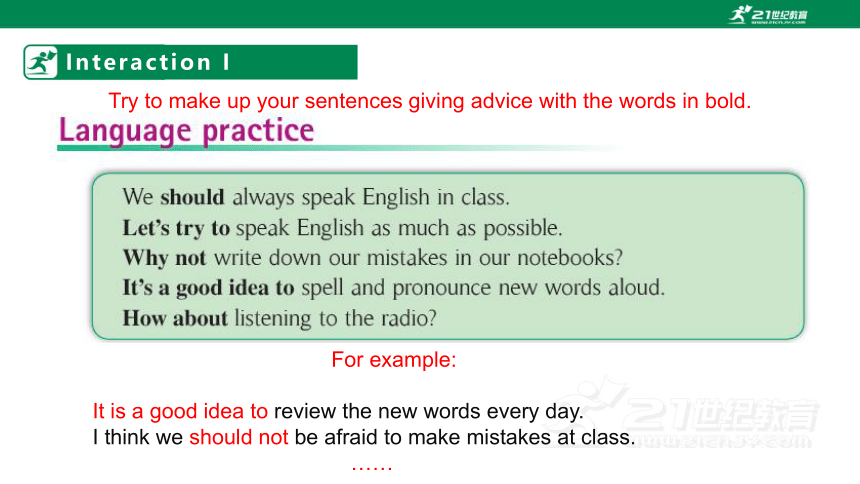
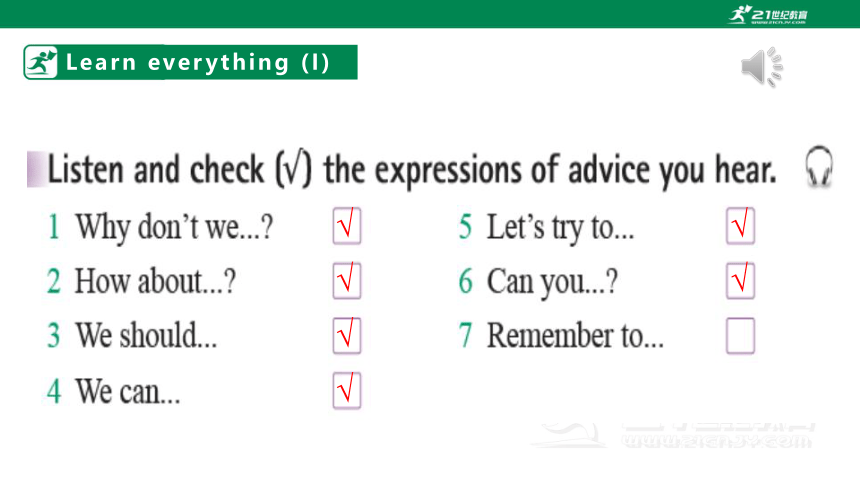
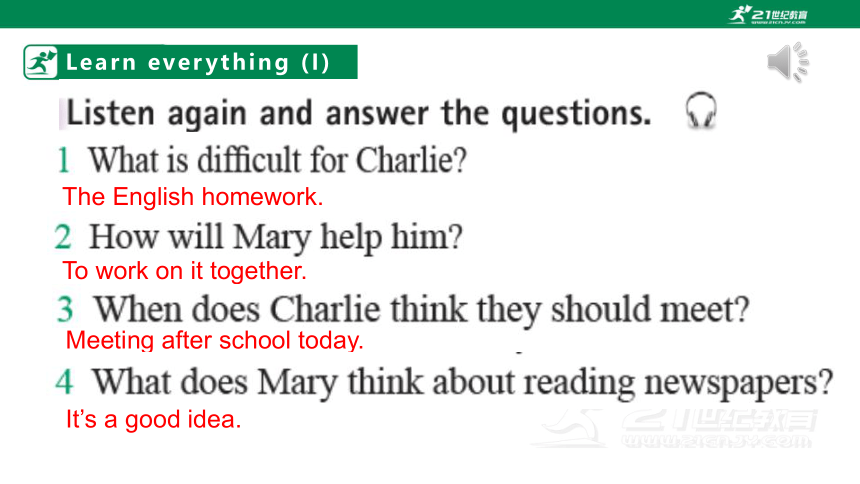
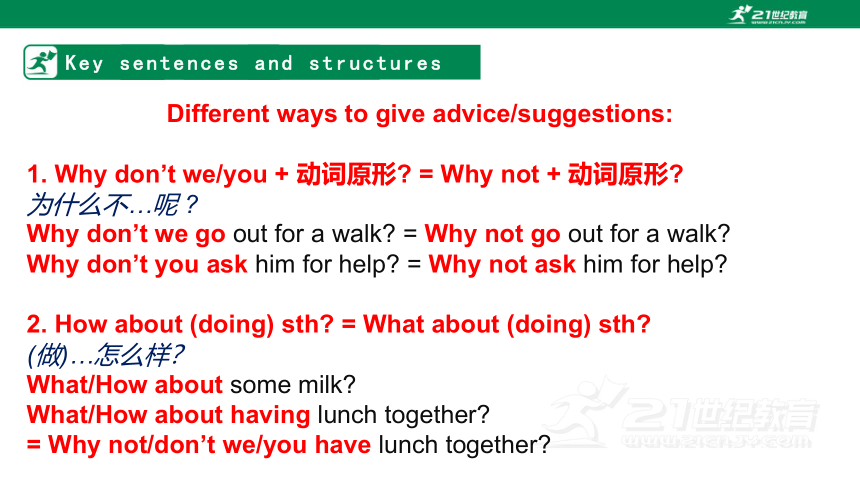
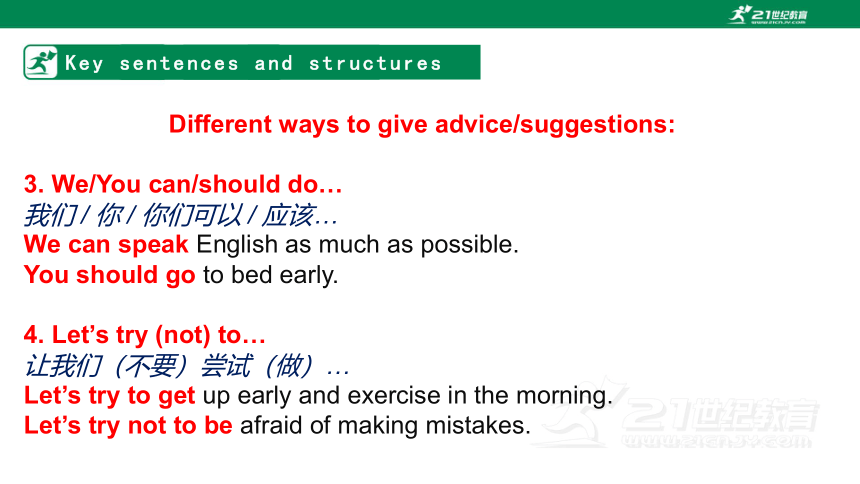
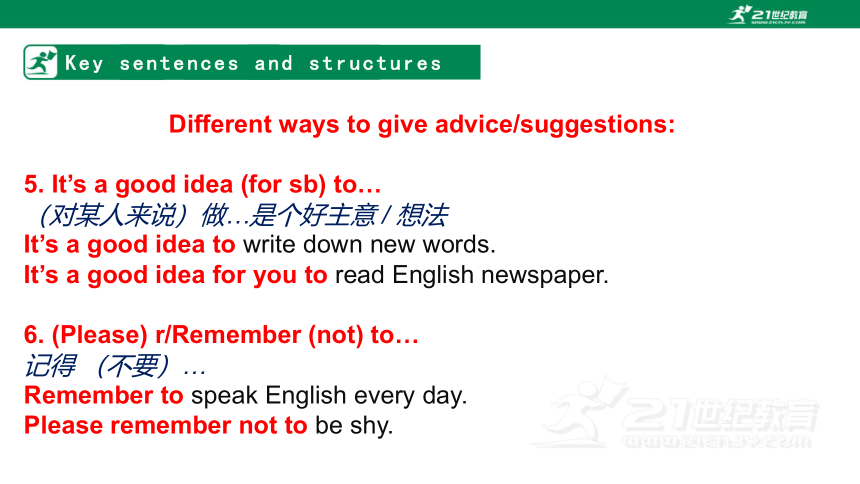
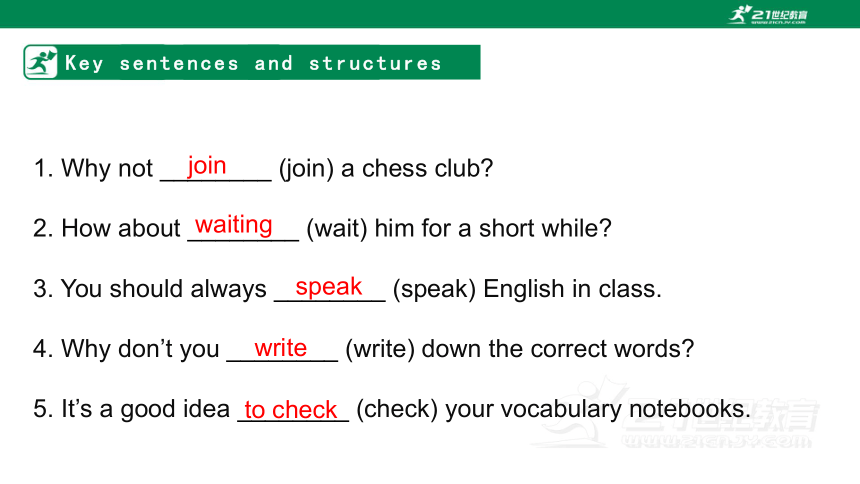
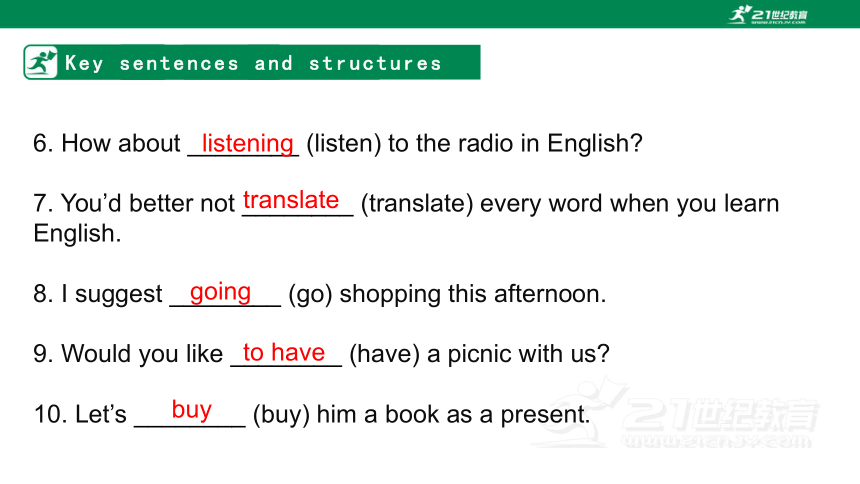
文档简介
(共39张PPT)
Module 1 How to learn English
外研版八年级上册
Unit 3
Language in use
Catalog
1. Warming-up and leading-in
2. Interaction I
3. Learn everything (I)
4. Key sentences and structures
Slice 4
Slice 5
Slice 6-7
Slice 8-12
………
………
………
………
5. Interaction II
Slice 13-16
………
Catalog
8. Exercise
9. Review and summary
10. Assignment
Slice 30-32
Slice 33-34
Slice 35-37
………
………
………
6. Learn everything (II)
Slice 16-23
………
7. Additional words and expressions
Slice 24-29
………
Learning objectives
Warming-up and leading-in
Read the following sentences and translate.
What do the sentences have in common
Yes, they are different ways to give advice.
Interaction I
For example:
It is a good idea to review the new words every day.
I think we should not be afraid to make mistakes at class.
……
Try to make up your sentences giving advice with the words in bold.
Learn everything (I)
√
√
√
√
√
√
Learn everything (I)
The English homework.
To work on it together.
Meeting after school today.
It’s a good idea.
Learning objectives
Key sentences and structures
Different ways to give advice/suggestions:
1. Why don’t we/you + 动词原形 = Why not + 动词原形
为什么不…呢
Why don’t we go out for a walk = Why not go out for a walk
Why don’t you ask him for help = Why not ask him for help
2. How about (doing) sth = What about (doing) sth
(做)…怎么样?
What/How about some milk
What/How about having lunch together
= Why not/don’t we/you have lunch together
Learning objectives
Key sentences and structures
Different ways to give advice/suggestions:
3. We/You can/should do…
我们 / 你 / 你们可以 / 应该…
We can speak English as much as possible.
You should go to bed early.
4. Let’s try (not) to…
让我们(不要)尝试(做)…
Let’s try to get up early and exercise in the morning.
Let’s try not to be afraid of making mistakes.
Learning objectives
Key sentences and structures
Different ways to give advice/suggestions:
5. It’s a good idea (for sb) to…
(对某人来说)做…是个好主意 / 想法
It’s a good idea to write down new words.
It’s a good idea for you to read English newspaper.
6. (Please) r/Remember (not) to…
记得 (不要)…
Remember to speak English every day.
Please remember not to be shy.
Learning objectives
Key sentences and structures
1. Why not ________ (join) a chess club
2. How about ________ (wait) him for a short while
3. You should always ________ (speak) English in class.
4. Why don’t you ________ (write) down the correct words
5. It’s a good idea ________ (check) your vocabulary notebooks.
join
waiting
speak
write
to check
Learning objectives
Key sentences and structures
6. How about ________ (listen) to the radio in English
7. You’d better not ________ (translate) every word when you learn English.
8. I suggest ________ (go) shopping this afternoon.
9. Would you like ________ (have) a picnic with us
10. Let’s ________ (buy) him a book as a present.
listening
translate
going
to have
buy
Interaction II
For example:
He usually goes to bed so late in the evening.
For example:
So he gets up late almost every morning.
For example:
He always listen to teachers carefully
at class.
Interaction II
For example:
He doesn’t like using his dictionary.
For example:
He reads English newspaper every day.
For example:
He writes new words in his notebook
after school.
Interaction II
For example:
- I think getting up late is not good.
- Why not
- Because everyone should try to get up early in the morning to be healthy.
……
Interaction II
For example:
He can use his dictionary often to improve his English.
He should get up early to exercise in the morning.
……
Learn everything (II)
Learn everything (II)
Learn everything (II)
Why don’t
How about
Try to
why not
How about
try to
should
Learn everything (II)
For example:
You can read aloud and then, you can speak English well soon.
……
Learn everything (II)
For example:
You should ask your teacher about the right book to read.
……
Learn everything (II)
improve
advice
check
possible
forget
Learn everything (II)
Learning objectives
Additional words and expressions
In addition to English magazines, newspapers and radio, there are various kinds of English learning websites.
in addition to (doing)…:除了…(还有);加之…
In addition to learning English, we must learn Chinese and math.
He gave me some useful advice, in addition to some books.
various:多种多样的
There are various ways to improve our English.
He decided to leave school for various reasons .
Learning objectives
Additional words and expressions
On the Internet, you can chat with other English speakers freely, and enjoy the latest English songs.
chat (v. & n): 闲谈; 聊天
We had a happy chat yesterday.
chat with sb about sth
We always chatted with each other
about how to improve ourselves.
chat over:一边…一边聊天;
They like to chat over tea.
Learning objectives
Additional words and expressions
Four Tenses Review
一般现在时(Present Simple):可以表示
①习惯性的行为(如①句)
②意愿(如②句)
③声明(如③句)
④实际的情况(如④句)
⑤和客观真理(如⑤句)
① I always go to school by bike.
② I want to remember all the new words.
③ I don’t think we can do that.
④ Here are three basic questions.
⑤ The earth goes around the sun.
Learning objectives
Additional words and expressions
Four Tenses Review
2. 一般过去时(Past Simple):可以表示
①过去发生的事情(如①②③句)
②过去的状态(如④句)
① Lingling made a mistake in grammar.
② I saw a very good film in the holiday.
③ What did Sam write in his letter
④ Were the five things in the newspaper
Learning objectives
Additional words and expressions
Four Tenses Review
3. 一般将来时(Future Simple):可以表示
①将来的动作(如①②句)
②将来的状态(如③句)
① We’re going to talk about good ways
to learn English.
② I will write that down in my notebook.
③ What will be in the newspaper
Learning objectives
Additional words and expressions
Four Tenses Review
4. 现在进行时(Present Continuous):可以表示
①目前正在进行的动作(如①②句)
②现阶段的情况(如③句)
① Who is she writing the email to
② What are you doing
③ Are you learning English this year
Exercise
1. — Where's your brother
— He ____ in his bed.
A. reads B. is reading C. read
2. Mr Gao ____ a song by himself two days ago.
A. wrote B. is writing C. writes
3. — Who is that lady
— She's Miss Green. She ____ us music, and she is so good.
A. taught B. teaches C. will teach
4. You'd better ____ go fishing in bad weather.
A. not B. not to C. to not
B
A
B
A
Exercise
5. What are you ____ this afternoon
A. going doing B. going to do C. go to do
6. Shall we go for a picnic this weekend
A. Sounds great B. You're welcome C. You are right
7. —Li Xian is very famous now.
— Yes, but he is not free like before. The reporters ____ follow him.
A. this time B. sometimes C. every time
8. It is wise ____ Linda to ____ so hard.
A. for; learning B. for; learn C. of; learn
B
A
B
C
Exercise
pronounce, a few, agree with, each time, get to know
9. Let's ___________ each other. What's your favourite colour
10. __________ I see you, I will remember the time we spent together.
11. — Would you like some more noodles, Celia
— Yes, just _________, please.
12. Betty's idea is great. I __________ her.
13. Please read these words and __________ aloud for five minutes.
get to know
Each time
a few
agree with
pronounce
Review and summary
Key sentences and structures
Different ways to give advice/suggestions
1. Why don't we/you + 动词原形 = Why not + 动词原形
2. How about (doing) sth = What about (doing) sth
3. We/You can/should do…
4. Let's try (not) to…
5. It's a good idea (for sb) to…
6. (Please) r/Remember (not) to…
So what have we learnt so far
Review and summary
Additional words and expressions
in addition to (doing)…
various
chat/chat with sb about sth/chat over
Present Simple
Past Simple
Future Simple
Present Continuous
So what have we learnt so far
Assignment
Speaking
Talk in English with my teacher
Grammar
Buy a grammar book to study
……
……
Assignment
Assignment
1. Review the notes taken at class,
especially the key points;
2. Work in pairs to finish Part 10 & 11;
3. Write a short passage according to Part 8, 9, 10 & 11 within 70 words;
4. Preview Unit 1, Module 2.
Thank You
21世纪教育网(www.21cnjy.com)
中小学教育资源网站
兼职招聘:
https://www.21cnjy.com/recruitment/home/admin
Module 1 How to learn English
外研版八年级上册
Unit 3
Language in use
Catalog
1. Warming-up and leading-in
2. Interaction I
3. Learn everything (I)
4. Key sentences and structures
Slice 4
Slice 5
Slice 6-7
Slice 8-12
………
………
………
………
5. Interaction II
Slice 13-16
………
Catalog
8. Exercise
9. Review and summary
10. Assignment
Slice 30-32
Slice 33-34
Slice 35-37
………
………
………
6. Learn everything (II)
Slice 16-23
………
7. Additional words and expressions
Slice 24-29
………
Learning objectives
Warming-up and leading-in
Read the following sentences and translate.
What do the sentences have in common
Yes, they are different ways to give advice.
Interaction I
For example:
It is a good idea to review the new words every day.
I think we should not be afraid to make mistakes at class.
……
Try to make up your sentences giving advice with the words in bold.
Learn everything (I)
√
√
√
√
√
√
Learn everything (I)
The English homework.
To work on it together.
Meeting after school today.
It’s a good idea.
Learning objectives
Key sentences and structures
Different ways to give advice/suggestions:
1. Why don’t we/you + 动词原形 = Why not + 动词原形
为什么不…呢
Why don’t we go out for a walk = Why not go out for a walk
Why don’t you ask him for help = Why not ask him for help
2. How about (doing) sth = What about (doing) sth
(做)…怎么样?
What/How about some milk
What/How about having lunch together
= Why not/don’t we/you have lunch together
Learning objectives
Key sentences and structures
Different ways to give advice/suggestions:
3. We/You can/should do…
我们 / 你 / 你们可以 / 应该…
We can speak English as much as possible.
You should go to bed early.
4. Let’s try (not) to…
让我们(不要)尝试(做)…
Let’s try to get up early and exercise in the morning.
Let’s try not to be afraid of making mistakes.
Learning objectives
Key sentences and structures
Different ways to give advice/suggestions:
5. It’s a good idea (for sb) to…
(对某人来说)做…是个好主意 / 想法
It’s a good idea to write down new words.
It’s a good idea for you to read English newspaper.
6. (Please) r/Remember (not) to…
记得 (不要)…
Remember to speak English every day.
Please remember not to be shy.
Learning objectives
Key sentences and structures
1. Why not ________ (join) a chess club
2. How about ________ (wait) him for a short while
3. You should always ________ (speak) English in class.
4. Why don’t you ________ (write) down the correct words
5. It’s a good idea ________ (check) your vocabulary notebooks.
join
waiting
speak
write
to check
Learning objectives
Key sentences and structures
6. How about ________ (listen) to the radio in English
7. You’d better not ________ (translate) every word when you learn English.
8. I suggest ________ (go) shopping this afternoon.
9. Would you like ________ (have) a picnic with us
10. Let’s ________ (buy) him a book as a present.
listening
translate
going
to have
buy
Interaction II
For example:
He usually goes to bed so late in the evening.
For example:
So he gets up late almost every morning.
For example:
He always listen to teachers carefully
at class.
Interaction II
For example:
He doesn’t like using his dictionary.
For example:
He reads English newspaper every day.
For example:
He writes new words in his notebook
after school.
Interaction II
For example:
- I think getting up late is not good.
- Why not
- Because everyone should try to get up early in the morning to be healthy.
……
Interaction II
For example:
He can use his dictionary often to improve his English.
He should get up early to exercise in the morning.
……
Learn everything (II)
Learn everything (II)
Learn everything (II)
Why don’t
How about
Try to
why not
How about
try to
should
Learn everything (II)
For example:
You can read aloud and then, you can speak English well soon.
……
Learn everything (II)
For example:
You should ask your teacher about the right book to read.
……
Learn everything (II)
improve
advice
check
possible
forget
Learn everything (II)
Learning objectives
Additional words and expressions
In addition to English magazines, newspapers and radio, there are various kinds of English learning websites.
in addition to (doing)…:除了…(还有);加之…
In addition to learning English, we must learn Chinese and math.
He gave me some useful advice, in addition to some books.
various:多种多样的
There are various ways to improve our English.
He decided to leave school for various reasons .
Learning objectives
Additional words and expressions
On the Internet, you can chat with other English speakers freely, and enjoy the latest English songs.
chat (v. & n): 闲谈; 聊天
We had a happy chat yesterday.
chat with sb about sth
We always chatted with each other
about how to improve ourselves.
chat over:一边…一边聊天;
They like to chat over tea.
Learning objectives
Additional words and expressions
Four Tenses Review
一般现在时(Present Simple):可以表示
①习惯性的行为(如①句)
②意愿(如②句)
③声明(如③句)
④实际的情况(如④句)
⑤和客观真理(如⑤句)
① I always go to school by bike.
② I want to remember all the new words.
③ I don’t think we can do that.
④ Here are three basic questions.
⑤ The earth goes around the sun.
Learning objectives
Additional words and expressions
Four Tenses Review
2. 一般过去时(Past Simple):可以表示
①过去发生的事情(如①②③句)
②过去的状态(如④句)
① Lingling made a mistake in grammar.
② I saw a very good film in the holiday.
③ What did Sam write in his letter
④ Were the five things in the newspaper
Learning objectives
Additional words and expressions
Four Tenses Review
3. 一般将来时(Future Simple):可以表示
①将来的动作(如①②句)
②将来的状态(如③句)
① We’re going to talk about good ways
to learn English.
② I will write that down in my notebook.
③ What will be in the newspaper
Learning objectives
Additional words and expressions
Four Tenses Review
4. 现在进行时(Present Continuous):可以表示
①目前正在进行的动作(如①②句)
②现阶段的情况(如③句)
① Who is she writing the email to
② What are you doing
③ Are you learning English this year
Exercise
1. — Where's your brother
— He ____ in his bed.
A. reads B. is reading C. read
2. Mr Gao ____ a song by himself two days ago.
A. wrote B. is writing C. writes
3. — Who is that lady
— She's Miss Green. She ____ us music, and she is so good.
A. taught B. teaches C. will teach
4. You'd better ____ go fishing in bad weather.
A. not B. not to C. to not
B
A
B
A
Exercise
5. What are you ____ this afternoon
A. going doing B. going to do C. go to do
6. Shall we go for a picnic this weekend
A. Sounds great B. You're welcome C. You are right
7. —Li Xian is very famous now.
— Yes, but he is not free like before. The reporters ____ follow him.
A. this time B. sometimes C. every time
8. It is wise ____ Linda to ____ so hard.
A. for; learning B. for; learn C. of; learn
B
A
B
C
Exercise
pronounce, a few, agree with, each time, get to know
9. Let's ___________ each other. What's your favourite colour
10. __________ I see you, I will remember the time we spent together.
11. — Would you like some more noodles, Celia
— Yes, just _________, please.
12. Betty's idea is great. I __________ her.
13. Please read these words and __________ aloud for five minutes.
get to know
Each time
a few
agree with
pronounce
Review and summary
Key sentences and structures
Different ways to give advice/suggestions
1. Why don't we/you + 动词原形 = Why not + 动词原形
2. How about (doing) sth = What about (doing) sth
3. We/You can/should do…
4. Let's try (not) to…
5. It's a good idea (for sb) to…
6. (Please) r/Remember (not) to…
So what have we learnt so far
Review and summary
Additional words and expressions
in addition to (doing)…
various
chat/chat with sb about sth/chat over
Present Simple
Past Simple
Future Simple
Present Continuous
So what have we learnt so far
Assignment
Speaking
Talk in English with my teacher
Grammar
Buy a grammar book to study
……
……
Assignment
Assignment
1. Review the notes taken at class,
especially the key points;
2. Work in pairs to finish Part 10 & 11;
3. Write a short passage according to Part 8, 9, 10 & 11 within 70 words;
4. Preview Unit 1, Module 2.
Thank You
21世纪教育网(www.21cnjy.com)
中小学教育资源网站
兼职招聘:
https://www.21cnjy.com/recruitment/home/admin
同课章节目录
- Module 1 How to learn English
- Unit 1 Let's try to speak English as much as possi
- Unit 2 You should smile at her.
- Unit 3 Language in use .
- Module 2 My home town and my country
- Unit 1 It's taller than many other buildings.
- Unit 2 Cambridge is a beautiful city in the east o
- Unit 3 Language in use .
- Module 3 Sports.
- Unit 1 Nothing is more exciting than playing tenni
- Unit 2 This year we training more carefully.
- Unit 3 Language in use .
- Module 4 Planes, ships and trains .
- Unit 1 He lives the farthest from school.
- Unit 2 What is the best way to travel.
- Unit 3 Language in use .
- Module 5 Lao She Teahouse.
- Unit 1 I wanted to see the Beijing Opera.
- Unit 2 It descibes the changes in Chinese society.
- Unit 3 Language in use .
- Module 6 Animals in danger.
- Unit 1 It allows people to get closer to them .
- Unit 2 The WWF is working hard to save them all.
- Unit 3 Language in use .
- Revision module A
- Module 7 A famous story
- Unit 1 Alice was sitting with her sister by the ri
- Unit 2 She was thinking about her cat.
- Unit 3 Language in use .
- Module 8 Accidents
- Unit 1 While the car were changing to red, a car s
- Unit 2 I was trying to pick it up when it bite me
- Unit 3 Language in use .
- Module 9 Population
- Unit 1 The population of China is about 1.37 billi
- Unit 2 Arnwick was a city with 200,000 people.
- Unit 3 Language in use .
- Module 10 The weathe
- Unit 1 It might snow.
- Unit 2 The weather is fine all year round.
- Unit 3 Language in use .
- Module 11 Way of life
- Unit 1 In China ,we open a gift later.
- Unit 2 In England, you usually drink tea with milk
- Unit 3 Language in use .
- Module 12 Help
- Unit 1 What should we do before help arrives?
- Unit 2 Stay away from windows and heavy furniture.
- Unit 3 Language in use .
- Revision module B
